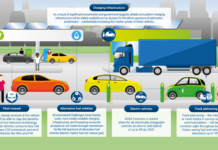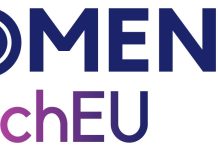A green industrial future for Europe may depend on an element that is part of a household staple: table salt.
Dr John Abou-Rjeily, a researcher at Tiamat Energy in France, is using sodium to develop rechargeable batteries. Sodium is a part of sodium chloride, an ionic compound that is the technical name for ordinary salt.
Supply sources
The idea behind sodium-ion batteries is to reduce Europe’s reliance on the lithium-ion ones that power everything from toothbrushes and mobile phones to mopeds and cars.
Today’s batteries include materials such as lithium, nickel and cobalt that are both scarce and toxic, whereas sodium is one of the most plentiful elements on Earth.
‘Sodium-ion batteries are based on more abundant and safer materials than lithium-ion batteries,’ said Abou-Rjeily. ‘There’s not enough lithium ions and cobalt and nickel to meet everyone’s needs.’
He is a research and development engineer at Tiamat, which designs and manufactures sodium-ion batteries.
Abou-Rjeily led an EU-funded research project to develop sodium-ion batteries that have commercial appeal and can serve as a new foundation for European manufacturing.
Called NAIMA, the project ran from December 2019 through May 2023. It featured companies, research institutions and universities in Bulgaria, Belgium, France, Germany, the Netherlands, Slovenia, Spain and Sweden.

Battery charge
Batteries are central to Europe’s drive to replace fossil fuels with renewable-energy sources such as wind and solar power. More clean energy in Europe requires new storage capacity that batteries can provide.
The European battery market could be worth as much as €250 billion a year as of 2025. Europe aims to increase its share of global battery-cell production to as high as 25% this decade from 3% in 2018, chipping away at Asia’s 85% dominance.
The EU is funding a range of research projects to ensure that Europe has an industrial base and supply network able to meet growing demand for batteries.
The research covers all segments of the supply chain – from access to raw materials needed to make batteries and the infrastructure required for storing energy to “smart grids” that automatically charge vehicles when power is cheapest and battery designs that ensure recycling.
Lithium-ion batteries can store lots of energy in a small space, making them winners for smart phones and electric cars. Sodium-ion batteries are slightly bigger and potentially cheaper, making them candidates for storing energy in places such as homes, power tools and small vehicles.
French connection
Abou-Rjeily, a trained chemist from Lebanon, moved to France in 2016 to pursue an interest in environmental sustainability.
He is at home with Tiamat, whose sodium-ion batteries exclude lithium, cobalt and copper and largely avoid nickel too. The company is a spinoff from the French National Centre for Scientific Research, or CNRS, which was among the NAIMA participants.
Lithium, cobalt, copper and nickel are on an EU list of critical raw materials, highlighting concerns in Europe about reliance on foreign suppliers and supply squeezes.
For example, when it comes to lithium-ion batteries worldwide, China manufactured almost 80% of them in 2021.
Furthermore, most global production of lithium-ion batteries is expected to go to the automotive industry.
Tiamat plans in 2026 to open a gigafactory in the French city of Amiens to produce sodium-ion batteries suitable initially for equipment such as power tools, according to Abou-Rjeily.
He said NAIMA helped advance the company’s battery know-how.
The project also helped partners move forward with a type of sodium-ion battery for renewable-energy storage. This kind of battery could also one day be suitable for some cars.
While it wouldn’t ever challenge the 500-kilometre capacity of lithium-ion batteries, this sodium-ion type could be more competitive for smaller stretches, according to Abou-Rjeily.
‘They could be cheaper for short and medium driving distances,’ he said.
Home base
An energy link between cars and homes through sodium-ion batteries is a vision of Dr Magdalena Graczyk-Zajac, a visiting professor at the Technical University Darmstadt in Germany.
Source: Horizon – The EU Research and Innovation Magazine























